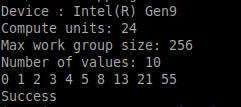OneAPI
Intel® has released a new platform for heterogeneous programming, that called OneAPI:
https://spec.oneapi.com/versions/latest/introduction.html
Using this platform, it's possible perform calculations on both CPU and GPU or FPGA. To be able to use the platform, need to install open source Intel® compute-runtime:
https://github.com/intel/compute-runtime
And also need to install Intel® oneAPI Toolkits
https://software.intel.com/content/www/us/en/develop/tools/oneapi.html
From my point of view very promising platform, especially in terms of speeding up computing for ML/DL. The platform itself is a programming language Data Parallel C ++ (DPS ++), which in turn is a mixture of C ++ and SYCL and additional tools by Intel®, like DPC++ Compiler or Video Processing Library, etc. This platform can compete with proprietary CUDA or bad supported OpenCL. Especially in light of Intel's upcoming discrete graphics cards.
So, what is look Hello World on DPS++
#include <CL/sycl.hpp>
#include <iostream>
using namespace cl::sycl;
constexpr int values[] = {0, 1, 2, 3, 4, 5, 8, 13, 21, 55};
constexpr size_t num_values = sizeof(values) / sizeof(int);
// ############################################################
// bootstrap_function initializes the result buffer
void bootstrap_function(int* result) {
for (size_t i = 0; i < num_values; ++i) {
result[i] = values[i];
}
}
// ############################################################
// Body of the application
void work(queue& q, int* result) {
buffer<int, 1> my_buffer(result, range<1>(num_values));
q.submit([&](handler& h) {
auto my_accessor = my_buffer.get_access<access::mode::read_write>(h);
h.single_task<class bootstrap>(
[=]() { bootstrap_function(&my_accessor[0]); });
});
q.wait_and_throw();
}
// ############################################################
// entry point for the program
int main(int argc, char** argv) {
int result[num_values];
auto exception_handler = [](cl::sycl::exception_list exceptionList) {
for (std::exception_ptr const& e : exceptionList) {
try {
std::rethrow_exception(e);
} catch (cl::sycl::exception const& e) {
std::cout << "ASYNCHRONOUS SYCL exception:\n" << e.what() << std::endl;
std::terminate(); // exit the process immediately.
}
}
};
try {
queue q(default_selector{}, exception_handler);
std::cout << "Device: " << q.get_device().get_info<info::device::name>()
<< std::endl;
std::cout << "Compute units: " << q.get_device().get_info<info::device::max_compute_units>()
<< std::endl;
std::cout << "Max work group size: " << q.get_device().get_info<info::device::max_work_group_size>()
<< std::endl;
work(q, result);
std::cout << "Number of values: " << num_values << std::endl;
for (auto i = 0; i < num_values; ++i) {
std::cout << result[i] << " ";
// Signal an error if the result does not match the expected values
if (result[i] != values[i]) throw -1;
}
std::cout << std::endl;
} catch (...) {
std::cout << "Failure" << std::endl;
std::terminate();
}
std::cout << "Success" << std::endl;
return 0;
}
the result of work the script:

July 9, 2020
Post your comment